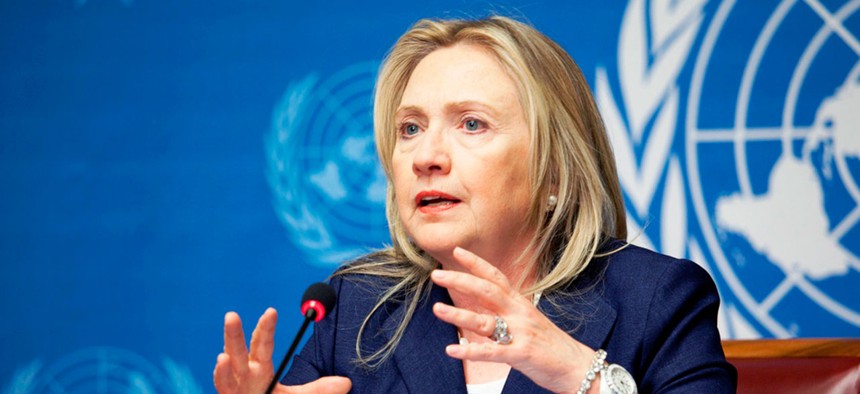
State Department file photo
Do Women Bosses Have an Extra Responsibility to Look Out For Women?
Hillary Clinton recently said that a woman boss has an extra responsibility to look out for the women who work for her. But do they?
Shortly after news broke that Hillary Clinton had allowed an advisor on her 2008 presidential campaign to keep his job after he was accused of sexual harassment, the former US secretary of State wrote an explanation on her Facebook page. “The short answer is this,” she wrote. “If I had it to do again, I wouldn’t.” She noted:
“I recognize that the situation on my 2008 campaign was unusual in that a woman complained to a woman who brought the issue to a woman who was the ultimate decision maker. There was no man in the chain of command. The boss was a woman. Does a woman have a responsibility to come down even harder on the perpetrator? I don’t know. But I do believe that a woman boss has an extra responsibility to look out for the women who work for her, and to better understand how issues like these can affect them.”
Clinton brings up an interesting question that has implications beyond her own decision. Do women managers have a responsibility to come down even harder on perpetrators of sexual harassment? An extra responsibility to look out for women who work for them?
Quartz at Work asked two women CEOs to weigh in on this question. One runs a technology company that makes software for desk-less workplaces. The other, a diversity and inclusion expert, founded a company that facilitates workshops on inclusion and leadership.
Stacey Epstein, CEO of Zinc:
“I appreciate the fact that [Hillary Clinton] takes the time to reflect, is willing to admit she wasn’t always perfect, and might make a different decision now. I even agree with the fact that maybe giving him the second chance was the right decision. As for the specific topic of whether or not women have an “extra” responsibility, I have a strong opinion that we don’t. In fact, by saying that we do, it somehow implies that men are held to a lesser standard. Do I think that women should align and support each other? Yes. Do I love groups like pantsuit nation and the women’s march? Yes! But should female managers be held to a higher standard in their response to harassment. No way.”
Michelle Kim, founder and CEO of Awaken:
“I think the question here comes down to what is the ideal versus reality. In an ideal scenario, all people would share the equal amount of responsibility to look out for each other. However, the unfortunate reality is that for too many people who have not experienced sexual harassment, or for people who hold certain privileges (of being white, cis-gender, male, heterosexual, etc.), seeing and recognizing the experiences of harm seems to be more difficult. Therefore, it pains me to admit that today, in order to raise awareness and call out injustice, the bulk of the burden is falling on the shoulders of marginalized people.
Women in positions of power shouldn’t have to shoulder additional burden of calling out injustices and holding abusers accountable. However, women often end up shouldering additional burden because others around them refuse to, or are gravely oblivious. But this is not to justify the imbalance of responsibility to look out for injustice—rather, I think people should start to recognize this imbalance and hopefully those in positions of privilege (e.g., men) can step up to the plate to share the burden. I mean, in a really ideal world, men would shoulder more responsibility to do better in calling out injustices against women and trans people, since they hold privileges women and trans folks do not. But I’d say we’re pretty far from being in that world.”






